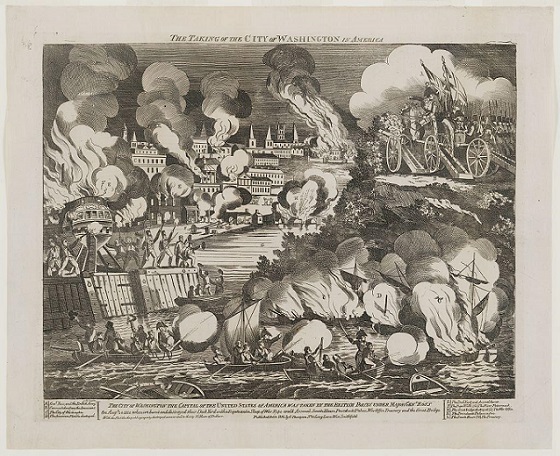Some wars have clear-cut outcomes. The winners and losers are unmistakable. The ending of the War of 1812 was much more ambiguous: no belligerent could claim an obvious victory. In the absence of a decisive victory, Americans struggled to define “victory” in the aftermath of the war.

West Smithfield, [London] : Published by G. Thompson No. 43 Long Lane, 1814 Oct. 14. Library of Congress Prints and Photographs Division Washington, D.C.
Certainly Americans had achieved some of their goals. A few days after the American declaration of war, the British rescinded the Orders in Council, the restrictions on neutral shipping that had so vexed Americans in the first decade of the nineteenth century. But achieving that goal had not required any fighting. Another important provocation for war, the British practice of impressment, was never resolved. At war’s end, the British refused to yield on the issue, and Secretary of State James Monroe dropped the matter during the peace negotiations at Ghent.
Some American failures were more explicit, with the bungled invasion of Canada the most widespread and notorious debacle. On the water, the United States had more to celebrate: its young fleet scored a series of impressive victories over the British, the world’s most powerful navy. And, though it occurred after the arrangements for peace had concluded, the United States’ lopsided victory at the Battle of New Orleans ended the Americans’ war on a triumphant note. All told, a fair assessment of the American outcome in the war might place it somewhere between a loss and a draw.
But defining victory can be tricky. The more significant implications of the war lay ahead, as the ambiguous terms of the Treaty of Ghent played out on the international stage. In particular, language in the treaty regarding restoration of Indian “possessions, rights and privileges” amounted to an implicit denunciation by the British of their erstwhile Indian allies. That, in turn, opened the door for further American westward expansion through Indian expulsion. Though the war itself might have been a draw (or even a defeat) ultimately the United States could be said to have won the peace. That success, of course, would have important implications for the native tribes whose lands and homes lay in the path of white Americans and their hunger for new territory.
Last updated: March 11, 2016
